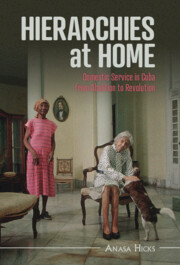Book contents
- Hierarchies at Home
- Afro-Latin America
- Hierarchies at Home
- Copyright page
- Dedication
- Contents
- Figures
- Tables
- Acknowledgments
- Author’s Note
- Introduction The Violent Intimacy of Nation-Building, Race, and Gender Inside Cuban Households
- 1 Embodied Anxieties
- 2 Of Domestic (and Other) Offices
- 3 Stopping “Creole Bolshevism”
- 4 Patio Fascists and Domestic Worker Syndicates
- 5 Pushing the Present into the Past
- 6 Conjuring Ghosts
- Conclusion
- Bibliography
- Index
6 - Conjuring Ghosts
Domestic Service’s Remains after 1959
Published online by Cambridge University Press: 18 August 2022
- Hierarchies at Home
- Afro-Latin America
- Hierarchies at Home
- Copyright page
- Dedication
- Contents
- Figures
- Tables
- Acknowledgments
- Author’s Note
- Introduction The Violent Intimacy of Nation-Building, Race, and Gender Inside Cuban Households
- 1 Embodied Anxieties
- 2 Of Domestic (and Other) Offices
- 3 Stopping “Creole Bolshevism”
- 4 Patio Fascists and Domestic Worker Syndicates
- 5 Pushing the Present into the Past
- 6 Conjuring Ghosts
- Conclusion
- Bibliography
- Index
Summary
Chapter 6 explores memories of domestic service and intimacy between the 1960s and 1980s. Using oral history interviews, the chapter argues that the memories of former domestic workers and former employers of domestic workers informed their racial politics in the present. These memories were almost entirely devoid of political activism, even though this book has demonstrated that domestics were politically active for all of twentieth-century Cuban history. Instead of politics, the emblematic memory that Cubans retained was “the emotional logic of domestic service,” which allowed and even celebrated harmony between black and white Cubans while maintaining a strict and often unspoken racialized hierarchy. After the official end to domestic service in the 1960s, nostalgia for domestic service became a way for anti-Communist Cubans in exile and on the island to argue that pre-1959 had not been racist, as the revolutionary government has always insisted. This chapter historicizes the emotions around domestic service and demonstrates that an institution that had always distilled racial hierarchy in Cuba into its purest form was used to argue for a horizontal equality that never existed.
- Type
- Chapter
- Information
- Hierarchies at HomeDomestic Service in Cuba from Abolition to Revolution, pp. 153 - 171Publisher: Cambridge University PressPrint publication year: 2022

